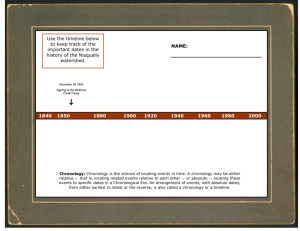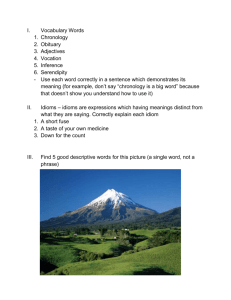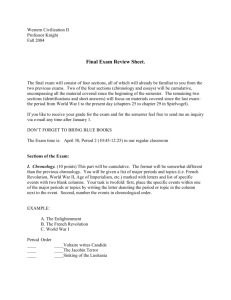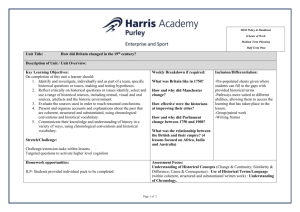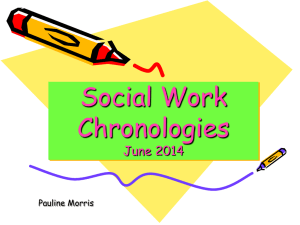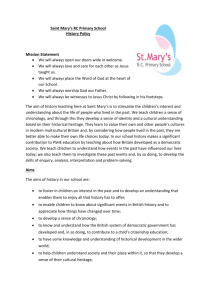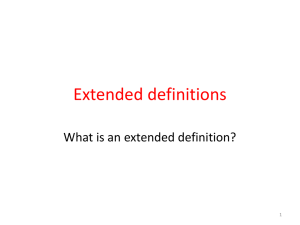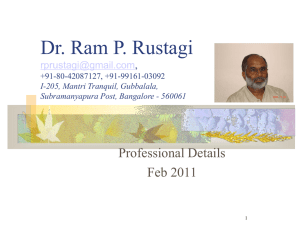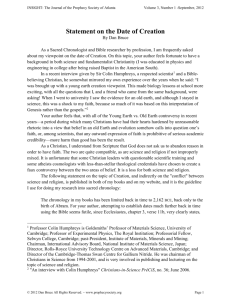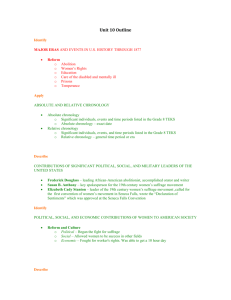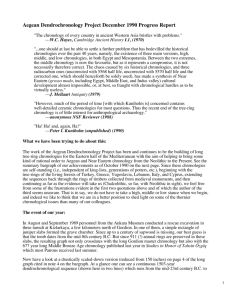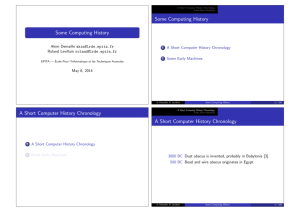The National Curriculum for history
advertisement
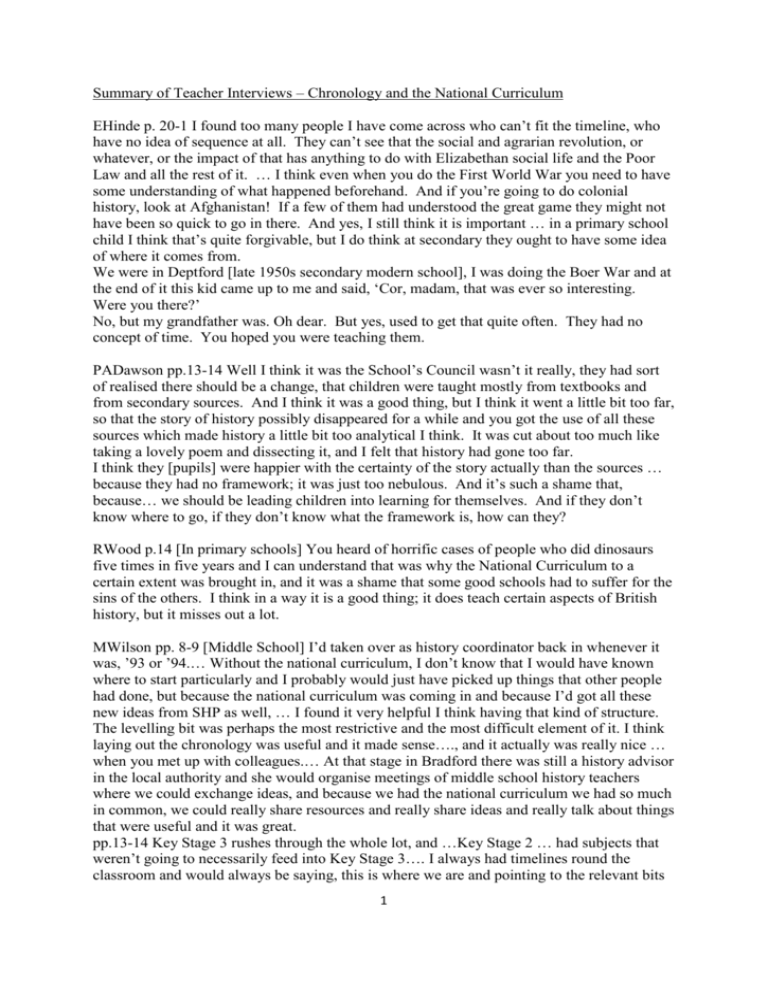
Summary of Teacher Interviews – Chronology and the National Curriculum EHinde p. 20-1 I found too many people I have come across who can’t fit the timeline, who have no idea of sequence at all. They can’t see that the social and agrarian revolution, or whatever, or the impact of that has anything to do with Elizabethan social life and the Poor Law and all the rest of it. … I think even when you do the First World War you need to have some understanding of what happened beforehand. And if you’re going to do colonial history, look at Afghanistan! If a few of them had understood the great game they might not have been so quick to go in there. And yes, I still think it is important … in a primary school child I think that’s quite forgivable, but I do think at secondary they ought to have some idea of where it comes from. We were in Deptford [late 1950s secondary modern school], I was doing the Boer War and at the end of it this kid came up to me and said, ‘Cor, madam, that was ever so interesting. Were you there?’ No, but my grandfather was. Oh dear. But yes, used to get that quite often. They had no concept of time. You hoped you were teaching them. PADawson pp.13-14 Well I think it was the School’s Council wasn’t it really, they had sort of realised there should be a change, that children were taught mostly from textbooks and from secondary sources. And I think it was a good thing, but I think it went a little bit too far, so that the story of history possibly disappeared for a while and you got the use of all these sources which made history a little bit too analytical I think. It was cut about too much like taking a lovely poem and dissecting it, and I felt that history had gone too far. I think they [pupils] were happier with the certainty of the story actually than the sources … because they had no framework; it was just too nebulous. And it’s such a shame that, because… we should be leading children into learning for themselves. And if they don’t know where to go, if they don’t know what the framework is, how can they? RWood p.14 [In primary schools] You heard of horrific cases of people who did dinosaurs five times in five years and I can understand that was why the National Curriculum to a certain extent was brought in, and it was a shame that some good schools had to suffer for the sins of the others. I think in a way it is a good thing; it does teach certain aspects of British history, but it misses out a lot. MWilson pp. 8-9 [Middle School] I’d taken over as history coordinator back in whenever it was, ’93 or ’94.… Without the national curriculum, I don’t know that I would have known where to start particularly and I probably would just have picked up things that other people had done, but because the national curriculum was coming in and because I’d got all these new ideas from SHP as well, … I found it very helpful I think having that kind of structure. The levelling bit was perhaps the most restrictive and the most difficult element of it. I think laying out the chronology was useful and it made sense…., and it actually was really nice … when you met up with colleagues.… At that stage in Bradford there was still a history advisor in the local authority and she would organise meetings of middle school history teachers where we could exchange ideas, and because we had the national curriculum we had so much in common, we could really share resources and really share ideas and really talk about things that were useful and it was great. pp.13-14 Key Stage 3 rushes through the whole lot, and …Key Stage 2 … had subjects that weren’t going to necessarily feed into Key Stage 3…. I always had timelines round the classroom and would always be saying, this is where we are and pointing to the relevant bits 1 and things.… You kind of make assumptions that they do remember but in actual fact if you ask children, and I have done since, can you remember when we did this, they will look at you blankly as if you never, ever taught the whole thing, which is slightly horrifying [laughter], but it’s a fact…. I think they don’t get that automatic overview picture of how things have developed. JDClare pp.24-5 It was utterly wrong that people didn’t go past the Armada. It did mean that we all fairly much taught the same thing at the same time. John Fines … said … that it would destroy brilliant history teaching, but it would improve the generality. And I think, looking back, he’s turned out to be absolutely correct in that. Personally, I didn’t have any problem with it at all, because I don’t think it matters what you teach, the content. I mean, some of it’s more interesting than others, but you can always find interesting bits. I hate the Stuarts with a vengeance. But you can always find something interesting to do. And so it didn’t bother me, them telling me what I had to teach. And of course the other thing is that… history teachers … are infinitely anarchic, and at the end of the day, they will say, “We want you to teach the British Empire”, and they have a very rightwing agenda when they want us to do that. And so we all go away and teach the British Empire, we teach the Amritsar massacre …. There are ways and means of subverting the intentions of those who have power. I think we’re very good at this, and it didn’t bother me at all. I enjoy teaching the national curriculum, and I enjoy writing the textbooks for it. All the revisions that were done were done with the ability to just carry on doing what you did…. The current national curriculum basically gives you the freedom to do anything you want whenever you want to… But actually, from everything I know, there’s many teachers just going on teaching what they set up in 1990 anyway…. And recently a guy went on the history teachers’ forum and said, “Can I do the Romans in Year 9?” and it was quite interesting, the reaction of … [Laughter] ‘Ooh, be careful,… don’t just do it because you want to do it, you’ve got to have a reason to do it and all the materials’. And it was quite funny, people’s reactions. On Chronology People talk about the skill of chronology, and it’s absolute nonsense. I think the first thing you have to understand is that teaching things in chronological order does not teach children chronology. Anybody who’s had a child knows that a child’s chronology goes me, my sister, mum lived in the olden days, Grandad was just after Jesus and the dinosaurs…. The question I always ask is this, ‘Mayan pre-Columbian civilisation, the kingdom of Benin, Han China. Put those in chronological order.’ Are you unable to do so? ‘Tut, you have no chronology skills.’ Chronology is not a skill; chronology is merely a function of learning. CHinton p.15 The challenge is to try and give the kids an overview of British history, which we do in years seven to nine, hope to motivate them to be concerned and interested in their history and there’s no doubt that certain things like Nelson …, they’re going to have to come to probably in later life, because there’s not going to be the time to learn them all in the period that the history curriculum has in school. And when it comes down to it, one wonders whether an overview of British history without something like Nelson is probably better than a bit more British history, but dropping something like the Holocaust or World War Two or World War One. Broadly speaking I think the National Curriculum was a positive development, although the overall approach of allowing subject specialists to work in silos on their subjects and then to lump the whole lot together made it much too unwieldy, overcrowded both within subjects and in totality. In history the outlined British themes through years seven to nine made sense 2 for developing a background on our cultural heritage. It was also important with lots of students finishing history at the end of year nine, that we did the twentieth century unit, which I think they needed to have access to. p.28 Now, year nines giving up history. This is a really difficult one. We are moving away from a broad and balanced curriculum to giving students what will motivate them…. I’m concerned that if this goes on we’re going to make it that every bricklayer’s son becomes a bricklayer and that perhaps we do not broaden the opportunity of some children. JHite p.17 Do you think that sixth formers that you’ve taught more recently have less chronological background? I think they have less knowledge.… I feel in a sense chronology is more important early on … when this presumably is a concept that needs developing in children, it’s not a natural development…. I think that certainly by the time you get to the sixth form, you know then if they’ve got some gaps, I don’t think gaps matter, as long as they’ve basically got an understanding of medieval issues compared to 17th Century ones, compared to 20th century issues. Why do you think their knowledge is less? Well I think that’s broader social factors. I think the decline of reading, the growth of alternative ways of learning or experiencing things, like the media, the internet, computers, things like that. I just feel that the sheer level of knowledge which might be relevant … is far lower than – I may be imbuing things with rose-tinted glasses – the Golden Age, as it were. … I do think that although students … have different knowledge … the level of historical knowledge is less strong than it was. But I don’t think there’s a major block in the basic sense of chronology. LTurner/RSnow (59) pp.25-7 RS:I thought it was trying to cram too much in, you know. There’s too many themes, like we had to introduce a French Revolution theme for the modern European… LT:And a lot of British history, we had to cram British history. RS: …You’ve got to cover it, was the expectation. Then after a few years, you [could] just chop it down to what you wanted, and no one seemed to mind what you were teaching, anyway. So it wasn’t the great change that I think they thought it was. LT: Yes, but it was awful to begin with, wasn’t it? Because can you remember doing your levels where we had levels within levels? ... We used to spend hours marking a piece of work and it was… we took it too seriously…. We tried to make it work. RS: That was not very good, and even then, these levels are so vague. It’s not a maths subject, you know, where you can just measure something like that. LT: And I still think we didn’t have enough training on those kinds of things. RS: Knowing stuff nowadays just seems to be … not important. It’s the skills or the transferable PLTS and things like that. But knowledge doesn’t seem to matter at all. They can look it up or they can find out, … that’s the argument. p.29 On the Importance of Knowledge in History RS: Well, today I said, “You’re going to have to learn the Treaty of Versailles. There’s no way you can do these GCSE questions unless you know the answer to, say, what happened to Germany’s armed forces. If you haven’t got a clue…”, and I gave them an example…. I spoke for a minute, saying, “Oh, their army was smaller” or “It was badly affected”, and just gave all these vague, bland statements. I said, “I’d spoken for a minute about it. In an exam you’ll get no marks because you’ve got no specific knowledge. You need to learn it.” And 3 they found it quite unusual, they’d have to learn a list of facts like how many men were in the army and … to know the battleships and submarines and learning that was important. JEdgar pp.18-19 Obviously the Dearing revision started to free up this content-led thing.… I think it’s the wider developments like AFL [assessment for learning] that give us the greatest scope because they take us away from… [the] terrible knocking out tick lists in the early ‘90s for progression. You know, what level were children at? ‘Oh I don’t know, let’s just tick this box’.… So I think in terms of assessment we’re in a much better place. We’re in a much better place in terms of the content, … we can really pick and choose in terms of flexibility of what we do. I think the big problem now is the squeeze on the curriculum. It isn’t the history itself, I think we’re perfectly sited to deliver very good quality history learning, but the problem is now, are we going to get the time to do it as everything else squeezes into the curriculum? And I think that’s particularly apt at Key Stage 4 because we’re competing with vocational subjects. DHughff p. 11 I’ve never taught before the National Curriculum so it’s always been there. When I first came into teaching, I had probably the most negative view of the National Curriculum that you could possibly have, because I think I was the first or second year to go through it when I was at school myself. And it all seemed to be was teachers didn’t spend the time teaching, they’d spend the time ticking boxes, and that put me off it. But it gives a bit of structure, that’s the important thing. I haven’t been particularly happy with this latest revision of the National Curriculum; I think the latest revision of the National Curriculum has become too thematic. … You’ve got to have the chronology, and that’s the big problem with our kids, you can’t go here, there and everywhere with it.… We’ve had to build a National Curriculum that we follow with the chronology aspect in the first term and a half, and then go on to the themes. And I think for kids it’s confusing…. I think the latest National Curriculum is hard to get to grips with that way. The old National Curriculum I found no problem to handle, I knew how it worked, I even knew how the levels worked perfect; I could level things with a lot of confidence. Since the new National Curriculum has come in and your levelling work, everything has gone down a grade, so a kid who would have been on a level three is now practically now a level four…. it’s basically inflated the levels…. But it’s only two years since it’s been introduced so it’s got to give time to bed in.… But I found the National Curriculum generally good; I preferred the old one. This new one I’m finding a bit more difficult. SBishop pp. 9-11. There’s a lot of stuff in the press about the National Curriculum being restrictive or too prescriptive or too loose, and actually I found that however you interpret the National Curriculum you probably end up teaching what you want to teach anyway. So I’ve never really found it a big issue, the National Curriculum. It’s never too prescriptive on what you have to teach, however that has changed recently…. The issue we have in education today is that there’s far too much politics in it… such as the Holocaust must be taught. But I wouldn’t know a school that wouldn’t … teach the Holocaust, but they might teach it in their RE lessons, but they now know it must be in the history lessons as well. It seems very patronising to history teachers to actually make that very prescriptive, and I think it comes from rumours that are in the press that children aren’t learning about this or that anymore, they’re all being taught socialist theory, you know especially if you read The Daily Mail…. As far as we’re concerned as a department, you’ve got year 7, 8 & 9s to give the kids a pretty good grounding of the basics of history, from 1066 to the 20th Century…. That was the other thing that the press apparently said, that the plan was no longer was British history being 4 taught. And I’ve never come across a school which at some point doesn’t teach British history…. I think … the press has completely overplayed what is happening in the classroom. To be honest, there’s probably not much … difference between the topics the students would study now and what they studied say 50 years ago, I really think that…. I do think that the National Curriculum for history that’s being introduced … [is] quite flexible; you can work round them if there’s something you totally disagree with. You mentioned in your survey form that the National Curriculum now, there’s more emphasis on overviews through themes. Do you think that’s helpful for students? Yes and no. I think it’s helpful for them to see how subjects link together, but I think it’s very unhelpful to take discrete subjects out of the particular path they’re going down. For instance in history I much prefer students to follow a chronological approach to key stage 3, but if you’re following themes and the themes have to be taught across the school then that actually could upset the chronological approach within history. p.11 I do think a chronological approach allows students to actually hang events on that timeline, and if they’ve learned them in that order they’ll probably realise that they’ve happened in that order. Otherwise you just give kids sort of a – they know something about evacuation, they know something about the trenches, but they might not be able to chronologically place the two next to each other…. we do timelines and overviews and we do in-depth studies and … we try and show them where they are in the sense of history. But I think it’s one of the benefits of approaching it in a chronological way. The children themselves actually do understand. But there are times that you do need to break away, for instance we’re doing the Slave Trade at the moment in year 8 but after half term we will move into Civil Rights in the USA, so there’s actually a break from the chronology, but that’s because this is a very interesting topic that has to be finished, you know, for it to make sense. 5
